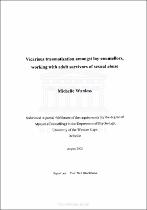| dc.description.abstract | The literature on vicarious traumatization suggests that when counsellors engage empathically with clients' trauma material deleterious effects on the counsellor result. The present study explored the effects on lay counsellors of working with adult sexual violence survivors, looking at the relations among nature of the work, personal characteristics and vicarious traumatization. Further, qualitative data explored counsellor perceptions of the effects of working with survivors and coping strategies. Thirty-six counsellors and volunteers from Rape Crisis and the Comfort Room Project were asked to complete a questionnaire containing the Traumatic Science Institute Belief Scale, Impact of Event Scale, and demographic information. to addition, counsellors were asked to list negative and enjoyable aspects of their work as well as various coping strategies utilised. The data were analysed using descriptive statistics to assess the level of vicarious traumatization (indicated by distress responses and disruptions in cognitive schemas) and step-wise multiple regression analyses to investigate which of the specific demographic variables significantly predicted intrusion symptoms, avoidance symptoms and disrupted cognitive schemas. In addition, analysis of responses to the open-ended questions consisted of frequency counts of identified themes. Results indicated that counsellors were experiencing moderate symptoms of distress reactions as well as disruptions in their cognitive schemas. Comparisons of the TSI sub-scales revealed that counsellors were experiencing the least disruption in the area of self-esteem and the most disruption in the area of other-safety. Relationships between some personal and work related factors and vicarious traumatization were revealed. With regard to personal factors a high level of education acted as a protective factor against both distress responses and disrupted cognitions and having personal therapy acted as a protective factor against disrupted cognitions. In addition, being older and having a personal trauma
history were risk factors for disrupted cognitions. With regard to the nature of the work supervision acted as a protective factor against distress responses and disrupted cognitions, while working more hours acted as a risk factor for disrupted cognitions. In addition, having a higher caseload acted as a protective factor against disrupted cognitions but as a risk factor for distress responses. Qualitative findings not only supported the quantitative findings but also expanded on them to include broader considerations of factors involved in trauma work thereby suggesting that the conceptualisation of vicarious traumatisation could be limited and that the development of more comprehensive research instruments is needed. The study highlights the importance of support, on both an organisational and individual level, for rape trauma counsellors as well as the need to address broader systemic issues. | en_US |

